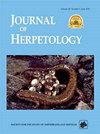两种Garter蛇(Thamnophis)的心脏位置与脊椎区域划分的关系
IF 0.8
4区 生物学
Q3 ZOOLOGY
引用次数: 3
摘要
摘要关于蛇体计划的进化,一个长期存在的问题是,轴向区域化和器官位置在多大程度上与一般的四足脊椎动物一致。在这里,我们评估了2种和13个吊脚蛇(Thamnophis)标本中脊椎形态相对于心脏位置的变化位置。通过解剖、几何形态计量学和描述椎骨颅骨形状的主成分分数的分段回归,我们确定了大约17%的泄殖腔前脊柱存在一致的形态转变。这一转变与心脏的位置非常一致,这表明脊椎区域的第一个主要转变与吊脚蛇心脏的纵向位置之间存在发育联系。我们的新发现有助于进一步认识到蛇的泄殖腔前脊柱是区域化的,这些区域在位置上与内脏的器官发生有关。本文章由计算机程序翻译,如有差异,请以英文原文为准。
Heart Position is Associated with Vertebral Regionalization in Two Species of Garter Snakes (Thamnophis)
Abstract. A long-standing question regarding the evolution of the snake body plan is to what extent does axial regionalization and organ position correspond with that of generalized tetrapod vertebrates. Here, we evaluated the position of shifts in vertebral morphology with respect to heart location in 2 species and 13 specimens of garter snakes (Thamnophis). From dissections, geometric morphometrics, and segmented regressions on principal component scores describing shape of the cranial aspect of vertebrae, we determined a consistent morphological transition at approximately 17% of the pre-cloacal vertebral column. The transition was strongly coincident with the position of the heart, suggesting a developmental link between the first major transition in vertebral regions and the longitudinal position of the heart in garter snakes. Our novel discovery has implications for further recognizing the pre-cloacal vertebral column of snakes as regionalized, and that these regions are positionally linked with organogenesis of the viscera.
求助全文
通过发布文献求助,成功后即可免费获取论文全文。
去求助
来源期刊

Journal of Herpetology
生物-动物学
CiteScore
1.60
自引率
0.00%
发文量
45
审稿时长
6 months
期刊介绍:
The Journal of Herpetology accepts manuscripts on all aspects on the biology of amphibians and reptiles including their behavior, conservation, ecology, morphology, physiology, and systematics, as well as herpetological education. We encourage authors to submit manuscripts that are data-driven and rigorous tests of hypotheses, or provide thorough descriptions of novel taxa (living or fossil). Topics may address theoretical issues in a thoughtful, quantitative way. Reviews and policy papers that provide new insight on the herpetological sciences are also welcome, but they must be more than simple literature reviews. These papers must have a central focus that propose a new argument for understanding a concept or a new approach for answering a question or solving a problem. Focus sections that combine papers on related topics are normally determined by the Editors. Publication in the Long-Term Perspectives section is by invitation only. Papers on captive breeding, new techniques or sampling methods, anecdotal or isolated natural history observations, geographic range extensions, and essays should be submitted to our sister journal, Herpetological Review.
 求助内容:
求助内容: 应助结果提醒方式:
应助结果提醒方式:


